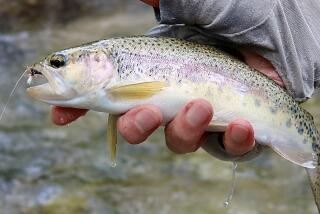Guppy sex proves the odd guy is in
When it comes to sex in the rivers of Trinidad, apparently the odd man is in.
Female guppies greatly prefer the spicy pisces, choosing to mate with males who are too cool for the school, according to a study published online Wednesday in the journal Nature.
“It’s good to be different, in this case -- if you’re a guppy,” said Kimberly A. Hughes, a Florida State University evolutionary biologist and coauthor of the study.
Fashion designers have known for some time that standing out in a crowd enhances your chances with the ladies, but evolutionary biologists have puzzled over why polymorphism persists over generations.
Hughes was fishing around the concept of negative frequency dependent selection, which favors a genotype that is rare. She and her colleagues from Lake Forest College and the University of Toronto turned to three populations of guppies in the Mausica and Quare rivers in Trinidad.
Over two seasons, they altered the ratio of rare to commonly colored male fish in the pools where they hung out, then scooped up the fish. The gal guppies were sent to their own aquariums, where they gave birth to two broods. (They store sperm for a month or more, so they can produce a second brood even if they’re not in the mood.) After that, it was standard Judge Judy type paternity testing, except with 1,400 offspring.
In the first brood, the “rare” patterned males sired twice the offspring as their duller homies, with twice the number of ladies. Body size and the presence of particular colors did not matter -- difference did.
“These results suggest it’s not just being colorful that matters, but being colorful in a different way than everyone else,” Hughes said. “This is one thing that can explain why organisms are so variable. Sometimes, just being different, just being rare, confers an advantage.”
When it came to paternity in the second brood, though, rarity didn’t seem to matter as much as did the color orange, which put some notches on the belts of male guppies among one population but decreased chances in two others.
Previous study suggests the color of the guppy dad can predict his sperm’s competitive ability, the authors note. And data also suggests gal guppies tend to get lucky at least once per cycle, so they don’t often resort to the store-over-score tactic.
Other species exhibit polymorphism, though not in as extreme a fashion as do male guppies. And often, males duke it out for access to the females. In this case, it appears the power is on the side of the females, whose tastes apparently change. (“La donna e mobile,” as Giuseppe Verdi would have it.)
To rub salt in the wounds of the chromatically challenged, the oddly colored males also seem to live longer. Flamboyance could be a secret signal of genetic strength, but Hughes suggested that the lesser-hued dude may go to greater lengths to attract attention -- and get the wrong kind.
“You might change your behavior and spend more time trying to get the female’s attention,” Hughes said. “And then you get eaten, because you make yourself conspicuous.”
Researchers speculate that choosing the odd man out could be an evolutionary adaptation for females to avoid inbreeding, which leads to offspring that don’t survive (or, among humans, who go on to lucrative careers in reality television).
Female guppies can remember more than a dozen individuals, studies have shown. And they have keener color sensitivity than do humans. So, they may just be choosing a dude they haven’t hooked up with lately.
So chill, guppy dudes. Next month, stripes could well be the new plaid.







